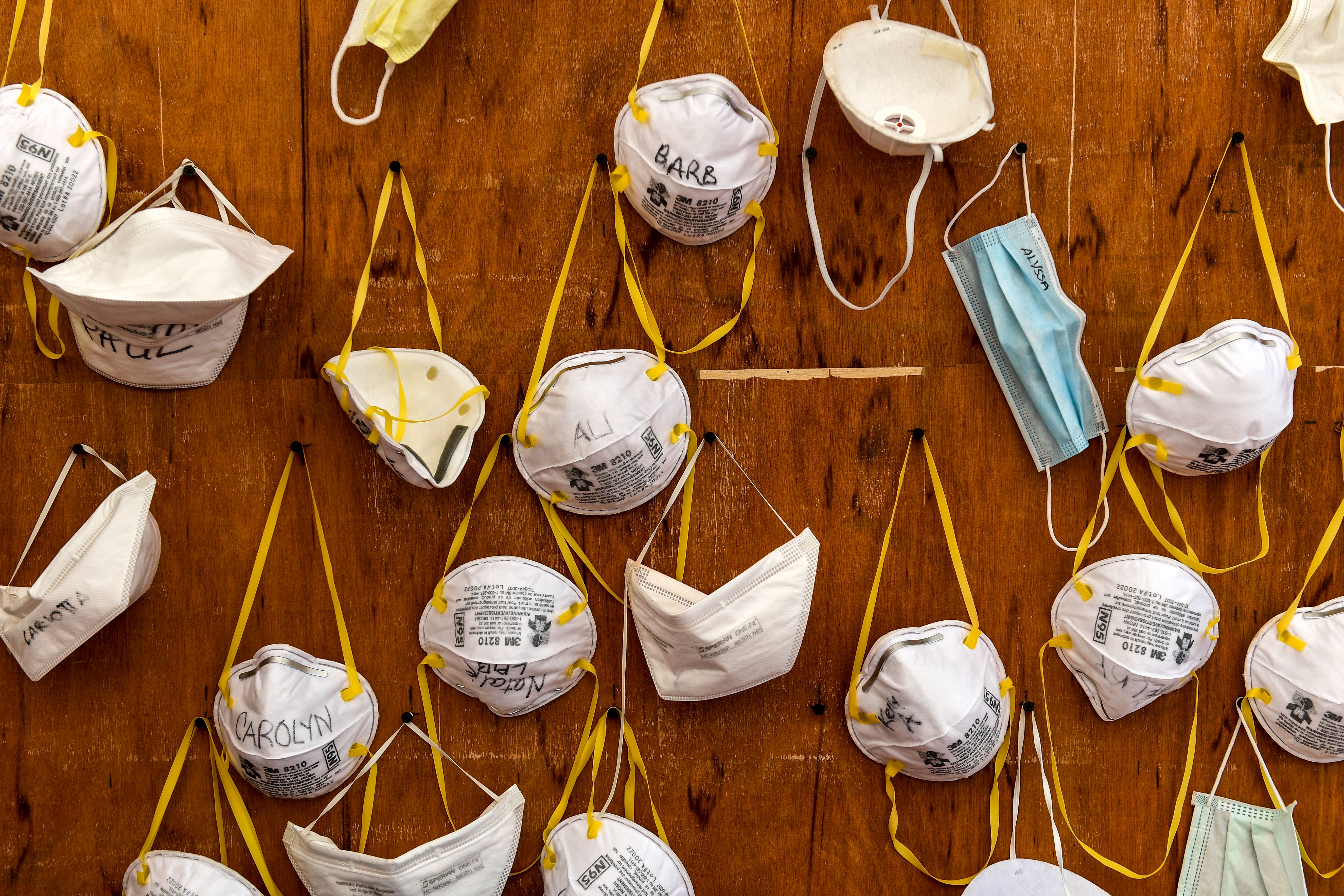Get a better mask
As more infectious coronavirus variants spread, all Americans should be equipped with high-filtration, tight-fitting face coverings


A free daily email with the biggest news stories of the day – and the best features from TheWeek.com
You are now subscribed
Your newsletter sign-up was successful
This is the editor's letter in the current issue of The Week magazine.
Come have a look at my mask collection. There, on a corner counter in my kitchen, is a heaping pile of protection: a box of blue surgical masks, two kinds of KF94s from South Korea, a dozen KN95s from China (NIOSH certified!), and several authentic N95s. I've shared my stash with my wife, my daughters, and my mom's caregivers, hoping to keep the coronavirus out of our bodies. At a time when so little is under control, masks give us a way of managing risk when we go out into our besieged world. In crowded indoor spaces where we work or buy food, high-quality masks with multiple layers can keep you from inhaling — or spreading — tiny droplets of aerosolized virus. The failure of our government to educate Americans about masks and make good ones available is "unconscionable," says Dr. Nahid Bhadelia, an infectious-disease expert at Boston Medical Center. She's among the many physicians calling for "the equivalent of Operation Warp Speed" to make and distribute high-filtration masks to all Americans at a cheap price.
A year ago, South Korea — a densely populated nation of 51 million people — immediately began widespread distribution of KF94 masks. It's had 1,441 COVID deaths, compared with nearly 450,000 in the U.S. In Taiwan, where mask wearing is also near-universal, there have been eight COVID deaths. With new coronavirus variants spreading, the need for high-quality masks — or double masking with a surgical and cloth mask — is even more urgent. The variants appear to be at least 50 percent more contagious, and may reduce the effectiveness of vaccines. Viral mutations might even reinfect those who've already had COVID. And it may be five or six months before vaccines are widely available in the U.S. So, friends, mask up — with the best ones you can find. Yes, wearing a mask can be annoying. But it's so much less annoying than wearing an oxygen mask in the ICU.
The Week
Escape your echo chamber. Get the facts behind the news, plus analysis from multiple perspectives.

Sign up for The Week's Free Newsletters
From our morning news briefing to a weekly Good News Newsletter, get the best of The Week delivered directly to your inbox.
From our morning news briefing to a weekly Good News Newsletter, get the best of The Week delivered directly to your inbox.
A free daily email with the biggest news stories of the day – and the best features from TheWeek.com
William Falk is editor-in-chief of The Week, and has held that role since the magazine's first issue in 2001. He has previously been a reporter, columnist, and editor at the Gannett Westchester Newspapers and at Newsday, where he was part of two reporting teams that won Pulitzer Prizes.
-
 Health insurance: Premiums soar as ACA subsidies end
Health insurance: Premiums soar as ACA subsidies endFeature 1.4 million people have dropped coverage
-
 Anthropic: AI triggers the ‘SaaSpocalypse’
Anthropic: AI triggers the ‘SaaSpocalypse’Feature A grim reaper for software services?
-
 NIH director Bhattacharya tapped as acting CDC head
NIH director Bhattacharya tapped as acting CDC headSpeed Read Jay Bhattacharya, a critic of the CDC’s Covid-19 response, will now lead the Centers for Disease Control and Prevention
-
 Epstein files topple law CEO, roil UK government
Epstein files topple law CEO, roil UK governmentSpeed Read Peter Mandelson, Britain’s former ambassador to the US, is caught up in the scandal
-
 Iran and US prepare to meet after skirmishes
Iran and US prepare to meet after skirmishesSpeed Read The incident comes amid heightened tensions in the Middle East
-
 Israel retrieves final hostage’s body from Gaza
Israel retrieves final hostage’s body from GazaSpeed Read The 24-year-old police officer was killed during the initial Hamas attack
-
 China’s Xi targets top general in growing purge
China’s Xi targets top general in growing purgeSpeed Read Zhang Youxia is being investigated over ‘grave violations’ of the law
-
 Panama and Canada are negotiating over a crucial copper mine
Panama and Canada are negotiating over a crucial copper mineIn the Spotlight Panama is set to make a final decision on the mine this summer
-
 Why Greenland’s natural resources are nearly impossible to mine
Why Greenland’s natural resources are nearly impossible to mineThe Explainer The country’s natural landscape makes the task extremely difficult
-
 Iran cuts internet as protests escalate
Iran cuts internet as protests escalateSpeed Reada Government buildings across the country have been set on fire
-
 US nabs ‘shadow’ tanker claimed by Russia
US nabs ‘shadow’ tanker claimed by RussiaSpeed Read The ship was one of two vessels seized by the US military
